For most of us, problems with third molars or “wisdom” teeth, are a fact of life that come with the “wisdom” of maturity! That’s why having them removed if often the best way to prevent problems.
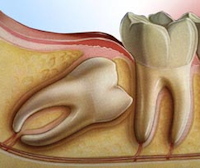
Wisdom teeth have earned the reputation for making trouble in this day and age when many of us have smaller jaws than our ancestors. Frequently when these third molars at the back of the mouth try to emerge, there’s not enough room for them, and the potential for trouble begins; making a strong case for having them removed as soon as possible.
Decayed tooth
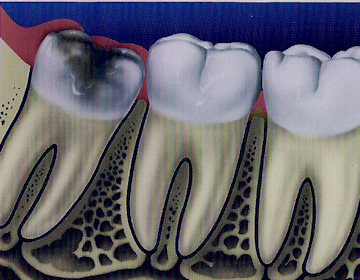
Crowding displaces next tooth
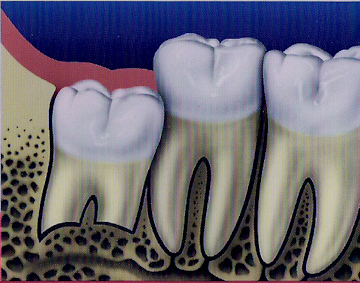
Poor position
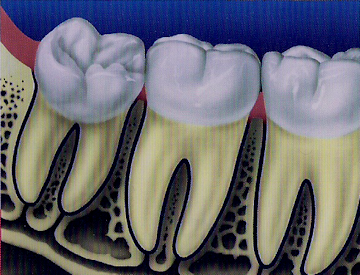
Cyst formation
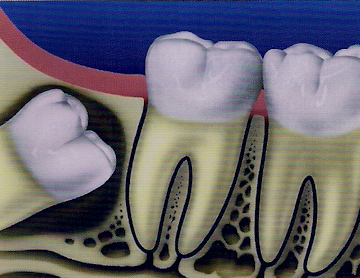
The best time to have your wisdom teeth removed is before they have a chance to cause other complications. If wisdom tooth removal has been discussed as an option for you, please feel free to share your concerns with us and we will be glad to advise you. We’re here to help you achieve the best possible oral health, and removing your wisdom teeth may be an important step toward that goal.
What Problems Can Wisdom Teeth Cause?
The tendency for wisdom teeth to become “impacted” or unable to move into their
proper position is the cause of most problems. Impacted wisdom teeth grow in any way
they can, such as sideways or at an angle. Some may partially break through the gum
surface, while others remain trapped beneath the gum and bones leading to a host of
potential complications:
- Infected gums
When the tooth has only partially broken through the surface, bacteria can enter through the opening or flap around the tooth and cause the gum to become infected. This uncomfortable condition is best avoided by having the wisdom teeth removed before infection can develop. - Decay
Because partially-emerged wisdom teeth are difficult to clean, plaque containing bacteria may form on the surface and create cavities in the wisdom tooth and adjacent teeth. - Crowding and structural damage to other teeth
When teeth become crowded, they lose their proper position in the mouth. Thorough cleaning becomes more difficult and teeth may wear unevenly or prematurely with structural damage as a result. These are just a few problems that may occur. - Cyst formation
When a wisdom tooth is impacted, the sac that surrounds the tooth can fill with fluid and form a cyst that is capable of damaging adjacent teeth, the jawbone and nerves.
How Do I Know If My Wisdom Teeth Need To Be Removed?
Because problems with wisdom teeth develop gradually and symptoms may or may not be present,
the best way to prevent trouble is to visit us regularly for check-ups and x-rays.
Regular exams help us prevent your wisdom teeth from threatening your dental health after all,
the ”best” kind of problem is one that can be prevented. In many cases, removing your wisdom
teeth can take you a long way toward avoiding problems in the future.
At What Age Should Wisdom Teeth Be Removed?
The best time is between the ages of 16 and 19, before the roots have a chance to
become firmly anchored in your jaw. Also, the older we get, the denser our jawbones
become, making removal more difficult as time goes on.
What Steps Are Involved With The Procedure?
During a preliminary examination, we will evaluate your dental and medical history and take
x-rays. The procedure itself depends upon how developed your wisdom teeth are.
We will use a local anesthetic and possibly other types of anesthesia such as nitrous oxide
(often referred to as laughing gas), intravenous sedation or general anesthesia.
If your surgery includes general anesthesia or intravenous medication, avoid eating or
drinking anything the night before and the morning of your surgery. We will review specific
instructions with you before you come in, such as wearing loose, comfortable clothing and making
arrangements for a family member or friend to drive you home after the surgery.
Following surgery, we will schedule a follow-up examination to make sure you are healing
properly or to remove stitches, if your surgery required any.
What Risks Are Involved Having Wisdom Teeth Removed?
As with any surgery, there are always risks to consider. You should be aware that certain
risks such as side effects from the anesthetic, bleeding or infection are occasionally
experienced with wisdom teeth removal, even though it is a common procedure where the benefits
still outweigh the risks. Other possible complications may include:
- Dry socket
After your wisdom teeth are removed, a blood clot forms to cover the socket as part of the normal healing process. If the blood clot dissolves or is washed away, you will probably experience the steady, throbbing pain of a dry socket. If this should occur, call us immediately so we can diagnose the problem and treat it properly. Generally, we will apply a medicated dressing to remedy the situation. - Numbness
Nerves near your wisdom teeth are sometimes injured when the tooth is removed, causing tingling or numbness. In most cases the nerve readily repairs itself.
What Can I Expect During The Healing Process?
During the normal healing process, you may experience initial swelling and discomfort in
your gums and jaw, making it wise to plan “taking it easy” for a few days after the surgery.
Discomfort and swelling can be relieved by placing ice packs on your face. We may also prescribe
pain medication to increase your comfort during the healing process and antibiotics if necessary.
Other things you can do to help with the healing process include:
- Drink lots of liquids and limit your diet to soft foods after the bleeding stops. Avoid hard or crunchy foods for at least two weeks.
- Avoid brushing the teeth next to the ones that were removed until at least a day after surgery. When you do begin brushing the area again, be very gentle so as not to disturb the blood clot that forms in the socket. For the same reason, don not rinse your mouth vigorously, smoke, spit forcefully or drink from a straw during the healing process.
- Avoid alcohol the day of surgery and do not mix with pain medications.
- Call us if you have fever, persistent and severe pain, excessive swelling or bleeding, or any adverse reaction to your medication.

 Call Us Today (440)835-1611
Call Us Today (440)835-1611



